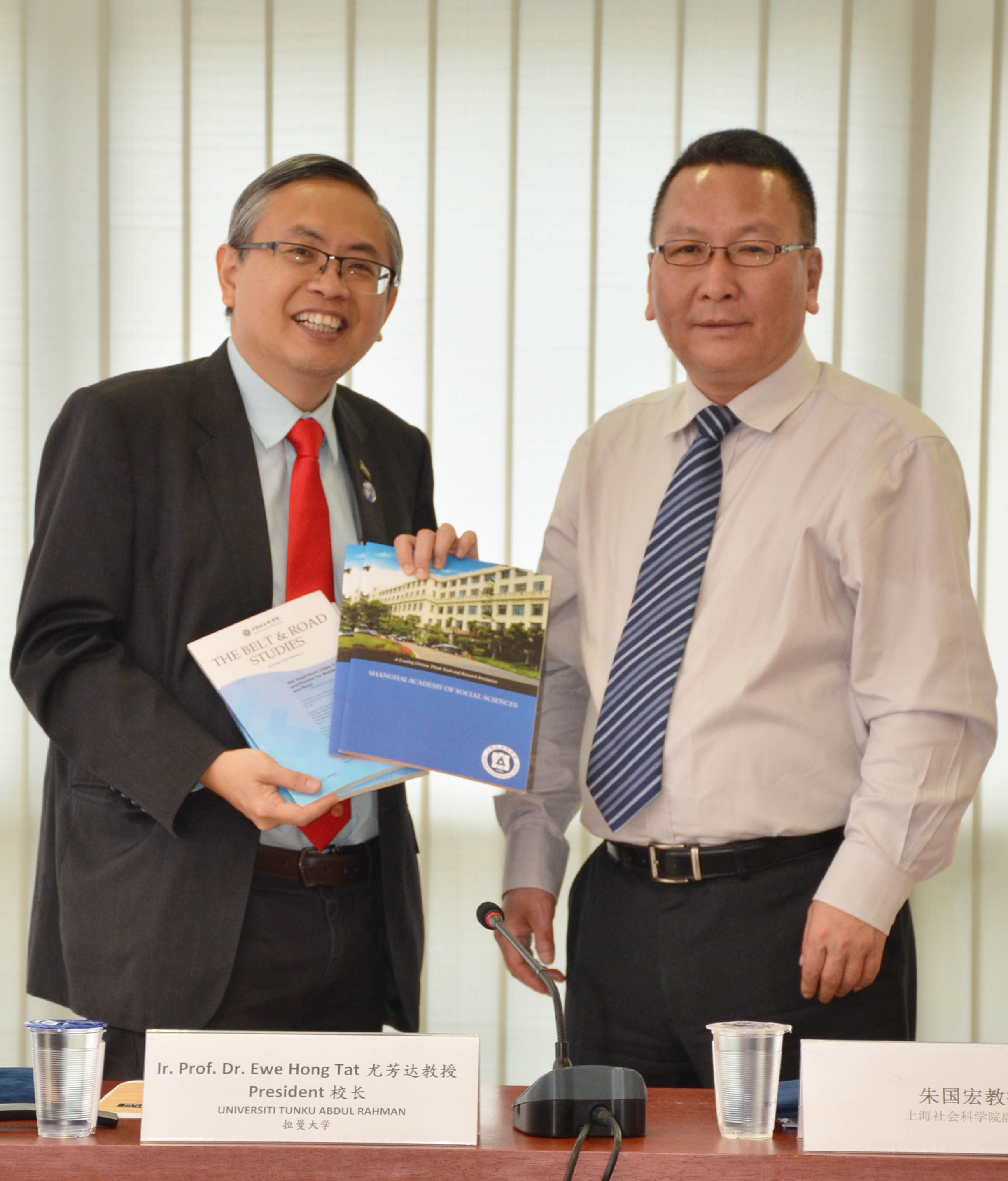
MoU inked to strengthen BRI cooperation

Prof Ewe (left) and Prof Zhu exchanging the MoU documents
UTAR and Shanghai Academy of Social Sciences (SASS) officially inked a memorandum of understanding (MoU) on 2 December 2019 at Sungai Long Campus.
Signing the MoU were UTAR President Ir Prof Dr Ewe Hong Tat and SASS Vice President Prof Zhu Guohong; while witnessing the signing were UTAR Division of Community and International Networking Director Assoc Prof Dr Lai Soon Onn and SASS Prof Xu Qingquan.
Also present at the event were SASS General Administrative Office Deputy Director Pan Xiang, Institute of World Economy Researcher Zhou Dapeng, Institute of International Relations Assistant Research Professor Zhang Qun, Office of International Cooperation Program Coordinator Zou Yi; UTAR Belt and Road Strategic Research Centre (BRSRC) Chairperson-cum-Institute of Management and Leadership Development (IMLD) Director Prof Dr Cheng Ming Yu, Tun Tan Cheng Lock Centre for Social and Policy Studies (TCLC) Chairperson Dr Chin Yee Mun, Centre for International Studies (CIS) Chairperson Dr Ho Ying Chan, Faculty of Accountancy and Management’s (FAM) Academic Development and Undergraduate Programmes Deputy Dean Dr Hen Kai Wah, Institute of Chinese Studies (ICS) Contemporary China Studies Unit Head Dr Chin Chong Foh, PhD Programmes Head Dr Priscilla Moses, MBA/MBA (Corporate Governance) Programmes Head Dr Ng Kar Yee, lecturers Dr Aik Nai Chiek, Dr Ngoo Yee Ting, Tan Wooi Yee, Dr Goh Hong Lip, Lim Yee Wui, Alexander Tay Guan Meng, Cheah Lee Fong, Goh Poh Jin and Lee Sim Kuen.


Souvenir exchange between Prof Ewe and Prof Zhu (right)
In his remarks, Prof Ewe gave a brief introduction on UTAR. He said, “In order to encourage more research works, the University has set up 32 research centres. One of the centres is called the Belt and Road Strategic Research Centre. We also have other centres which are related to social science.” He mentioned that research is important in the development drive of a nation and explained the past collaborations that the University had done to enhance the staff and students’ learning experience. He also mentioned that the University always encourages the students to go abroad so that they could enrich themselves and gain a more sophisticated understanding of the cultural differences.
On the other hand, Prof Zhu explained that SASS is China's oldest institution for the humanities and social sciences. Highlighting the importance of building a mutual understanding, he hoped that researchers from both institutions could have better communication. He believed that there are many areas to collaborate with UTAR. He also took the opportunity to extend an invitation to UTAR staff and students to visit SASS.

In the mid of the discussion
The MoU signing ceremony was then followed by presentations and discussion among the delegates with the purpose to enhance both sides’ understanding. In her presentation, Prof Cheng provided a brief introduction about BRSRC, stating that the centre was just established in 2018 and it focused more on the area of economic development. Sharing her research study, she mentioned that it was important to promote Belt and Road Initiative (BRI) to people who do not know the initiative instead of those who know well.
Zhang, on the other hand, shared an analysis based on the five-connectivity framework in her presentation which focused on the BRI’s development in the ASEAN countries. She also talked about the challenges of implementing BRI and illustrated the pessimistic and optimistic scenario for future BRI prospects. Moreover, Dr Ng shared her research study which focused on public understanding and perception toward the BRI project in Malaysia. She presented the data collected from 200 respondents, explaining that 50 per cent of the respondents have never heard about BRI before and most of them were aged 21 to 30. She said, “It shows a very contrast result because, in another 50 per cent of the respondents who heard about BRI, the majority of them were undergraduates.”
In his presentation, Dr Zhou Dapeng talked about the status, problems and suggestions on China-Malaysia economic and trade cooperation. According to him, Malaysia was the first ASEAN country to establish diplomatic relations with China and invite China to join the “10+1” cooperation mechanism. He talked about the bilateral trade and investment between the two countries, saying that China is Malaysia’s largest trading partner for 10 conservative years and the largest sources of foreign investment in manufacturing for three consecutive years.
He pointed out the problems need to be settled, commenting that the operating methods of Chinese-funded enterprises need to be improved. “Many large Chinese companies are used to sourcing raw materials from their home country. Some Malaysian SMEs complain about too few opportunities to participate in cooperation,” he explained. When talked about the suggestions, he said, “We should look objectively at the scepticism and negative views of some Malaysian on the BRI. Let’s work together to make China-Malaysia’s cooperation in the Belt and Road construction become a model for China-ASEAN development in the economic and trade area.”

From left: Goh Hong Lip, Alexander Tay, Lim, Dr Ng, Dr Aik, Zhang u Yi, Prof Cheng, Zhou Dapeng, Pan, Prof Xu, Prof Zhu, Prof Ewe, Dr Ho, Dr Lai, Dr Chin Chong Foh, Lee, Cheah, Dr Hen, Dr Chin Yee Mun, Dr Priscilla, Goh Poh Jin, Dr Ngoo and Tan
![]()
© 2019 UNIVERSITI TUNKU ABDUL RAHMAN DU012(A).
Wholly owned by UTAR Education Foundation Co. No. 578227-M LEGAL STATEMENT TERM OF USAGE PRIVACY NOTICE